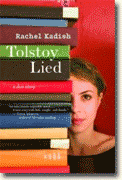Tolstoy Lied
Rachel Kadish
book reviews:
· general fiction
· chick lit/romance
· sci-fi/fantasy
· graphic novels
· nonfiction
· audio books
· author interviews
· children's books @
curledupkids.com
· DVD reviews @
curledupdvd.com
newsletter
win books
buy online
links
home
for authors
& publishers
for reviewers
East meets West across time and tradition as three young American women and their Indian immigrant mothers take first steps toward true sisterhood, shattering secrets and sharing joy and tears in Rachel Kadish's
Tolstoy Lied .
 |
Tolstoy Lied Rachel Kadish Mariner Paperback 336 pages September 2007 |
|
One of the most pertinent questions regarding Tolstoy Lied
Besides her philosophical thoughts on books, Tracy Farber has a multitude of personal issues to deal with as well. From the slightly crazy co-worker who seems bent on making her and her prize graduate student’s lives a living hell to George, the reformed fundamentalist Christian whom Tracy finds irresistible, Farber is constantly having to prove Tolstoy’s thesis wrong – that she can have a happy life and still have a story worth telling. And it is definitely a struggle. Farber has difficult situations thrown at her out of left field, yet manages to handle them with a grace that Anna Karenina only wished she had. This makes Tracy extremely endearing; by the end of the first 100 pages, the reader is rooting for Tracy Farber, wanting her to prove Tolstoy wrong. And this is where the kudos to Rachel Kadish comes in. In Tolstoy Lied Originally published on Curled Up With A Good Book at www.curledup.com. © Swapna Krishna, 2007 |
| Also by Rachel Kadish: |
|
|
|
 Click here to learn more about this month's sponsor! |
|
| fiction · sf/f · comic books · nonfiction · audio newsletter · free book contest · buy books online review index · links · · authors & publishers reviewers |
|
| site by ELBO Computing Resources, Inc. | |
 The main character in
The main character in